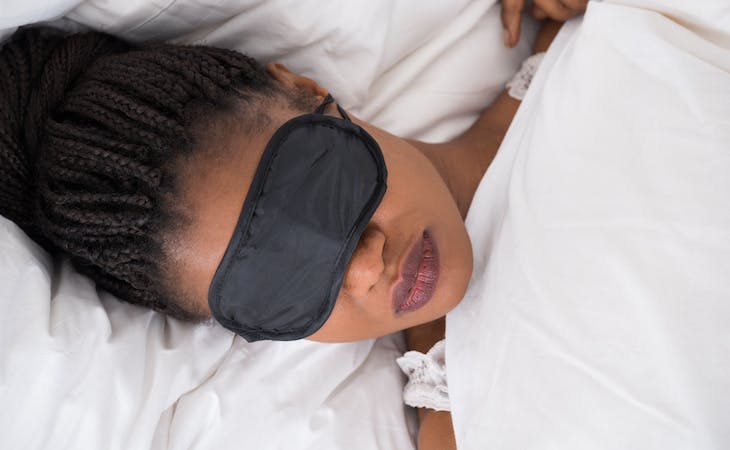If you’re anything like me, then Googling “what to do if I can’t sleep” is second nature to you. People with chronic insomnia—or anyone who struggles with falling asleep in a timely manner—are always on the lookout for the next trick to help them instantly drift off to dreamland the second they hit the pillow.
But getting into a healthy sleep routine is about connecting multiple puzzle pieces together, rather than just searching for a magic bullet. Below, we’re sharing our best tips for getting yourself to sleep when it seems impossible.
What to do when you can’t sleep
If you struggle with getting sleep for any reason, check out these 15 tips that can help you build a better sleep routine. Follow this advice, and hopefully, you’ll spend less time tossing and turning once your head hits the pillow.
Watch this video about how to put together a relaxing nighttime routine:
Wait 30 minutes
It may sound counterintuitive, but if you can’t sleep and you’ve been lying in bed for up to 30 minutes, get out of bed! Hear me out: Staying in bed can perpetuate the anxiety and frustration of not being able to drift off to sleep. Get up and try one of the following soothing activities below to get yourself back on track for sleep.
Make sure your bedroom is cool and dark
Keep your bedroom cool and dark so it can naturally alert your body that it’s time to sleep. Set the temperature to somewhere between 60 and 67 degrees for a comfortable sleep where you won’t wake up in the middle of the night sweating. Also try blackout curtains or a sleep mask to ensure the light from cars, street lights, and more don’t disturb you.
Practice yoga
Many yoga positions are meant to exclusively help the body relax and destress. Choosing any one of these to practice before bedtime can help quiet your mind, encourage blood flow, and slow down your heart rate. Try keeping your legs raised against a wall, sitting in a child’s pose, or any of these other calming yoga poses.
Try meditation
Like yoga, meditation can also help lower your blood pressure and reduce stress and anxiety. One of the easiest ways to ease into meditating is to practice the actionable 4-6 breathing technique. Breathe in for four seconds, hold briefly, then breathe out for six seconds. Find more ways to meditate here.
Take deep breaths
Deep breathing helps your nervous system relax and cues your brain that it’s time to wind down. Check out this deep breathing technique from a sleep medicine specialist to get started.
Stretch your body
Your body may benefit from doing a certain movement each night to let your brain know it’s time for rest. Stretching calmly before bed can help start the flow of sleep hormones to your brain. Try these relaxing nighttime stretches to prep your body for sleep.
Write in a journal
One reason you may not be able to sleep is that you’re mentally going over your “to-do” list instead of relaxing your mind and body. Journaling before bed can help you get rid of any lingering thoughts or stressors kicking around in your head.
Listen to white noise
City dwellers, listen up! Adding a white noise machine to your bedroom can be a game-changer if you live with loud roommates or constant hustle and bustle outside of your window. Just remember: It’s best to place a white noise machine on the floor near your door versus underneath your pillow or on your nightstand so it doesn’t directly disturb you. And if you’re using white noise in a child’s room, make sure to keep the volume lower and check the decibel level.
Sniff a calming scent
There’s real science behind how different scents can help calm you down and alleviate stress. Add a pillow mist, diffuser, or candle (blow it out before falling asleep!) to your bedtime routine. Pairing this with any of the above or below tips and tricks can help you build a solid nighttime routine that trains your body to wind down over time.
Drink tart cherry juice
In a study published in the Journal of Medicinal Food, participants with insomnia were given either two eight-ounce glasses of tart cherry juice each day or a placebo drink. After two weeks, the participants who had received the cherry juice were sleeping for an average of 85 minutes longer each night. Because this juice is so nutrient-rich, it can also help reduce inflammation. Read up on everything tart cherry juice can help with here.
Ways to promote better sleep
While the above tips can help you in a pinch, the best thing you can do is establish healthy habits that work long-term. Here are a few additional tips that can help round out your new sleep routine, plus hidden stressors that could be keeping you awake at night without you realizing it.
Stick to a regular sleep schedule
Maintaining a regular sleep schedule—even on the weekends — is key to building better sleep habits. Even if you stay out a little later on the weekend and go to bed at a different time, aim to get up as close as possible to your normal wake-up time.
Nix caffeine in the afternoon
When was the last time you had a mid-afternoon slump and reached for coffee much later than noon? Not so fast: Waking up in the middle of the night, staying up late and binge-eating, and increased anxiety and headaches are all signs you could be having too much caffeine during the day. Experts recommend switching to decaf by 2 p.m. each day.
Stop eating three hours before bedtime
Acid reflux could be the sneaky ailment keeping you up at night. To avoid this and get a restful sleep, experts suggest having your last meal or snack three hours before you plan on getting into bed. Heartburn and indigestion are usually worse at night, so play it safe and avoid this as much as possible by wrapping up your meals earlier.
Exercise during the day
Those who exercise regularly report better quality of sleep than those who don’t work out. Tiring your body out during the day (within reason) is a great way to lull yourself into sleep at night. Experts suggest working out earlier in the day as opposed to later to ensure you’re wound down by the time bedtime rolls around.
Optimize your bedroom for sleep
In addition to controlling the temperature and keeping your room dark at nighttime, how your bedroom is set up can contribute to your overall sleep quality as well. Keep things clutter-free and invest in a great mattress and comfy, cooling sheets to keep your body temperature regulated throughout the night.
Saatva offers a wide range of soft, breathable sheets and high-quality mattresses that will help you ease into a healthy sleep routine.







